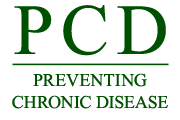PCD News Summary for November 10, 2020

Notice to News Media – PCD Release Time and Embargo Policy:
CDC’s News Media Branch releases to reporters the PCD media packet every Tuesday afternoon between 12 and 2 pm.
Embargoed until Thursday, November 12, 2020, at 12:00 PM ET
Statewide Prevalence of Smoke-Free and Vape-Free Homes, by Tobacco Product Use, Minnesota, 2018
A new study of Minnesota adults found that most adults who use e-cigarettes, including those who live with children, allow e-cigarette use in their homes and are potentially exposing others to secondhand aerosol. Researchers analyzed data from the Minnesota Adult Tobacco Survey (MATS), a series of cross-sectional, random-digit–dial telephone surveys on smoking, vaping, and other tobacco-related behaviors, attitudes, and beliefs among Minnesota adults. MATS measured voluntary smoke-free rules in the home in 2014 and 2018 and vape-free rules in 2018. The prevalence of smoke-free home rules among Minnesota adults in 2018 was 91.5%, up slightly from 89.3% in 2014, and a substantial increase from 64.5% in 1999 (15). As smoke-free home rules approach universal adoption, persistent disparities in the prevalence of smoke-free home rules are beginning to disappear. In 2018, although older and lower-income adults continued to be less likely to report smoke-free rules than younger or higher-income adults, men and women and adults with varying levels of education were equally likely to report rules against smoking in the home. Although widespread adoption of voluntary smoke-free and vape-free home rules demonstrates a positive change in social norms, most e-cigarette users allow vaping in their homes, including those who live with children younger than 18. Tracking voluntary smoke-free and vape-free home rules and efforts to encourage them are important to improve the public’s health.
Contact
Melissa Newton
Idoneous Consulting
Preventing Chronic Disease (PCD)
Centers for Disease Control and Prevention
mnewton@cdc.gov
###
Note: Not all articles published in PCD represent work done at CDC. In your stories, please clarify whether a study was conducted by CDC (“a CDC study”) or by another institution (“a study published by CDC”). The opinions expressed by authors contributing to PCD do not necessarily reflect the opinions of CDC or the institutions with which the authors are affiliated. PCD requests that, when possible, you include a live link to the article in your stories.
###
U.S. DEPARTMENT OF HEALTH AND HUMAN SERVICES
CDC works 24/7 protecting America’s health, safety and security. Whether diseases start at home or abroad, are curable or preventable, chronic or acute, stem from human error or deliberate attack, CDC is committed to respond to America’s most pressing health challenges.
